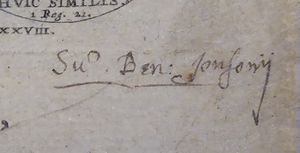Difference between revisions of "Ben Jonson 1574-1637"
m (David moved page Ben Jonson to Ben Jonson 1574-1637 without leaving a redirect) |
|||
| (4 intermediate revisions by 2 users not shown) | |||
| Line 3: | Line 3: | ||
====Biographical Note==== | ====Biographical Note==== | ||
| − | Born (probably) in [[location::London]], son of a [[occupation::clergyman]] who died soon after his birth. His education relied mainly on | + | Born (probably) in [[location::London]], son of a [[occupation::clergyman]] who died soon after his birth. His education relied mainly on Westminster School ; after spending some years following his stepfather's trade as a [[occupation::bricklayer]], he joined the army in [[location::The Netherlands]] in the early 1590s, before returning to [[location::London]] to become an [[occupation::actor]]. His own plays began to bring success, with ''Every man in his humour'' (1598) establishing his reputation (that year, he was nearly executed for killing a man in a duel). By the time of James I's accession in 1603 he was recognised as a leading [[occupation::poet]] and [[occupation::playwright]], and further successful plays followed (e.g. ''Sejanus'', 1604; ''Volpone'', 1606, ''The Alchemist'', 1610)). In 1612 he travelled in [[location::Europe]] as a [[occupation::tutor]] to [[crossreference::Sir Walter Ralegh]]'s son. The publication of his collected ''Workes'' in 1616 "consolidated his position as England's foremost living author" (''ODNB''). He was favoured by James I and involved in court life; his fortunes waned somewhat under Charles I but he continued to write plays and poems until the end of his life. |
====Books==== | ====Books==== | ||
Jonson acquired books throughout his life, although he is known to have lost some in a fire in 1623; he sold some during his lifetime to raise money, and the rest were dispersed after his death, so survivors are now widely spread around the world. David McPherson's work (see below) identified just over 200 books known to have been owned by Jonson; subsequent work has increased that number to around 300. The books are mostly in [[language::English]] or [[language::Latin]], with many [[subject::classics|classical]] and [[subject::literature|literary]] titles. | Jonson acquired books throughout his life, although he is known to have lost some in a fire in 1623; he sold some during his lifetime to raise money, and the rest were dispersed after his death, so survivors are now widely spread around the world. David McPherson's work (see below) identified just over 200 books known to have been owned by Jonson; subsequent work has increased that number to around 300. The books are mostly in [[language::English]] or [[language::Latin]], with many [[subject::classics|classical]] and [[subject::literature|literary]] titles. | ||
| − | + | [[file:P1180633(1).JPG|thumb|300px|Jonson's inscription, British Library 568.b.22, P. Bertius, De aggeribus et pontibus, 1629]] | |
| + | [[file:P1180630(1).JPG|thumb|300px|Jonson's motto, British Library 568.b.22, P. Bertius, De aggeribus et pontibus, 1629]] | ||
====Characteristic Markings==== | ====Characteristic Markings==== | ||
| − | Jonson regularly inscribed his titlepages with his name (typically "Su[m] Ben: Jonsonij"), and the motto ‘Tanquam | + | Jonson regularly inscribed his titlepages with his name (typically "Su[m] Ben: Jonsonij"), and the motto ‘Tanquam explorator’ ("like an explorer"). His books are sometimes annotated, sometimes with textual marginalia, more often with underlining or marginal symbols. |
====Sources==== | ====Sources==== | ||
Latest revision as of 10:08, 16 December 2021
Ben JONSON 1574-1637
Biographical Note
Born (probably) in London, son of a clergyman who died soon after his birth. His education relied mainly on Westminster School ; after spending some years following his stepfather's trade as a bricklayer, he joined the army in The Netherlands in the early 1590s, before returning to London to become an actor. His own plays began to bring success, with Every man in his humour (1598) establishing his reputation (that year, he was nearly executed for killing a man in a duel). By the time of James I's accession in 1603 he was recognised as a leading poet and playwright, and further successful plays followed (e.g. Sejanus, 1604; Volpone, 1606, The Alchemist, 1610)). In 1612 he travelled in Europe as a tutor to Sir Walter Ralegh's son. The publication of his collected Workes in 1616 "consolidated his position as England's foremost living author" (ODNB). He was favoured by James I and involved in court life; his fortunes waned somewhat under Charles I but he continued to write plays and poems until the end of his life.
Books
Jonson acquired books throughout his life, although he is known to have lost some in a fire in 1623; he sold some during his lifetime to raise money, and the rest were dispersed after his death, so survivors are now widely spread around the world. David McPherson's work (see below) identified just over 200 books known to have been owned by Jonson; subsequent work has increased that number to around 300. The books are mostly in English or Latin, with many classical and literary titles.
Characteristic Markings
Jonson regularly inscribed his titlepages with his name (typically "Su[m] Ben: Jonsonij"), and the motto ‘Tanquam explorator’ ("like an explorer"). His books are sometimes annotated, sometimes with textual marginalia, more often with underlining or marginal symbols.
Sources
- Donaldson, Ian. "Jonson, Benjamin [Ben] (1572–1637), poet and playwright." Oxford Dictionary of National Biography.
- Duroselle-Mellish, C., Ben Jonson's Library, The Collation.
- Evans, R. Ben Jonson’s library and marginalia: new evidence from the Folger collection, Philological Quarterly 66 (1987), 521-8.
- Evans, R. Ben Jonson’s Chaucer, English Literary Renaissance 19 (1989), 324-45.
- McPherson, D. Ben Jonson’s library and marginalia: an annotated catalogue, Studies in Philology 71 (1974), 1-106.
- Smyth, A., Burning to read: Ben Jonson's library fire of 1623, in Partington, G. et al (eds), Book desctruction from the medieval to the contemporary, London, 2014, 34-54.
- Ben Jonson, Catalogue of English literary manuscripts 1450-1700.
- Ben Jonson inscription in Sion College Library.

